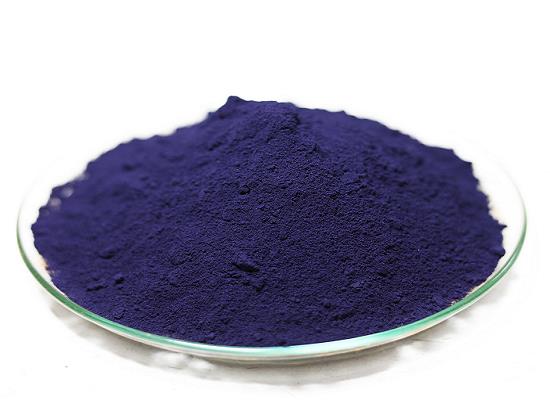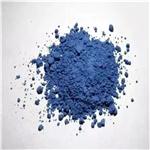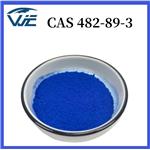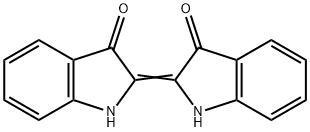Indigo: mechanism of action and applications in psoriasis treatment
Aug 1,2023
General Description
Indigo and its formulations have shown significant efficacy in treating psoriasis. They regulate keratinocyte proliferation, differentiation, and apoptosis, primarily by inhibiting cell DNA synthesis and blocking cell-related cycles. Indigo inhibits the expression of cell division cycle protein 25B (CDC25B), which is involved in cell proliferation. It also inhibits the activation of the epidermal growth factor receptor (EGFR) and induces apoptosis in abnormal keratinocytes. Clinical applications include systemic and topical use of indigo, with topical treatment showing promising results and fewer side effects. The combination of indigo with other drugs, such as traditional Chinese medicine, has also been effective. Further research is needed to improve treatment options for psoriasis.

Figure 1. Indigo
Mechanism of action
Indigo and its formulations have been found to play a significant role in the treatment of psoriasis. They regulate epidermal morphogenesis by modulating the proliferation, differentiation, and apoptosis of keratinocytes (KCs). Indigo mainly acts by inhibiting cell DNA synthesis, blocking cell-related cycles, and reducing the number of KCs, thus exerting an anti-psoriatic effect. One key mechanism is the inhibition of the cell division cycle protein 25B (CDC25B), which is involved in cell proliferation. Indigo can effectively reduce the expression of CDC25B in KCs at both mRNA and protein levels. This inhibitory effect was also observed with indirubin, another component of indigo formulations. Moreover, indigo and indirubin were shown to down-regulate the growth-dependent expression of CDC25B in serum-stimulated and immortalized KCs. EGF receptor, highly expressed in psoriatic lesions, plays a role in cell proliferation. Indigo and indirubin inhibit the activation of EGF receptor, leading to reduced cell proliferation and CDC25B expression in epidermal KCs. Additionally, indirubin induces apoptosis in KCs, particularly in those that haven't reached the normal degree of differentiation. This helps maintain the self-stability of the cell population and contributes to the treatment of psoriasis. 1
Applications in psoriasis treatment
Clinical applications
In the clinical application of indirubin for psoriasis treatment, both systemic and topical approaches have shown promising results. Systemic use of indigo has demonstrated ideal outcomes in treating psoriasis but is often associated with gastrointestinal adverse reactions and liver damage. Therefore, topical treatment with indigo ointment has been explored as a safer alternative. Studies have shown that indigo ointment effectively treats psoriatic lesions without significant systemic side effects. Patients treated with indigo ointment experienced considerable improvements, including nearly complete healing of the lesion site and substantial reductions in the area and severity of psoriatic lesions measured by the Psoriasis Area and Severity Index (PASI) and total body surface area (TBSA). Furthermore, no allergic reactions or dermatitis were observed, and blood parameters and liver and renal function remained within the normal range. To enhance patient convenience and treatment efficacy, researchers developed a refined colorless formulation called Lindioil, which showed comparable safety and therapeutic effects to crude indigo ointment. The refined formulation was found to inhibit the proliferation and differentiation of epidermal keratinocytes, contributing to its therapeutic mechanism. Additional research has analyzed the histological changes in skin tissue after indigo ointment treatment. Results demonstrated that topical indigo ointment significantly reduced clinical scores related to induration, scaling, erythema, and clearance rate. It appears that indigo ointment regulates the inflammatory response of psoriatic lesions by modulating the proliferation and differentiation of epidermal keratinocytes and inhibiting inflammatory infiltration by the cellular immune system. 2
Combined use of drugs
The combination of indigo with other drugs, such as Shugan granule in traditional Chinese medicine, has been found to improve the therapeutic effect in psoriasis treatment. Studies have shown that the combination treatment has advantages in terms of effectiveness, shorter treatment time, lower recurrence rate, and improved quality of life for patients. Additionally, combining oral administration of indigo with external traditional Chinese medicine use has also shown positive clinical efficacy with reduced adverse reactions. These drug combinations work together to regulate excessive epidermal proliferation and effectively alleviate psoriasis symptoms. However, there are still some disadvantages in current treatment research, including the lack of normalization and standardization in understanding the disease's causes and mechanisms, as well as the absence of qualitative and quantitative objective indicators in drug usage. Further research is needed to develop more efficient formulations and drugs to improve the treatment of psoriasis. 3
Reference
1. Hsieh WL, Lin YK, Tsai CN, Wang TM, Chen TY, Pang JH. Indirubin, an acting component of indigo naturalis, inhibits EGFR activation and EGF-induced CDC25B gene expression in epidermal keratinocytes. J Dermatol Sci, 2012, 67(2):140-146.
2. Lin YK, See LC, Huang YH, Chi CC, Hui RC. Comparison of indirubin concentrations in indigo naturalis ointment for psoriasis treatment: a randomized, double-blind, dosage-controlled trial. Br J Dermatol, 2018, 178(1):124-131.
3. Zhang Q, Xie J, Li G, Wang F, Lin J, Yang M, Du A, Zhang D, Han L. Psoriasis treatment using Indigo Naturalis: Progress and strategy. J Ethnopharmacol, 2022, 297:115522.
- Related articles
- Related Qustion
- Indigo: physicochemical properties, production pathways and biological production Jan 15, 2024
Indigo is a dye derived from natural plants and can be produced through plant-based or microbial fermentation pathways, with genetic engineering offering improvements for sustainable production.
- Production Methods of Indigo Oct 30, 2019
Indigo, or indigotin, is a dyestuff originally extracted from the varieties of the indigo and woad plants. Indigo was known throughout the ancient world for its ability to color fabrics a deep blue.
Mebendazole treats parasitic infections, including cerebral echinococcosis. It has potential as an anticancer drug. Side effects include gastrointestinal symptoms and rare serious effects.....
Aug 1,2023APILuteolin inhibits inflammation, tumor growth, and promotes healing. It shows promise in treating skin cancer, wounds, and psoriasis.....
Aug 1,2023APIIndigo
482-89-3You may like
- indigo
-

- $45.00 / 1kg
- 2023-12-20
- CAS:482-89-3
- Min. Order: 1kg
- Purity: 97%
- Supply Ability: 5000ton
- Indigo Blue
-

- $50.00 / 1KG
- 2023-08-16
- CAS:482-89-3
- Min. Order: 1KG
- Purity: >99%
- Supply Ability: 20tons
- Indigo
-

- $0.00 / 20mg
- 2023-02-24
- CAS:482-89-3
- Min. Order: 5mg
- Purity: ≥98%(HPLC)
- Supply Ability: 10 g




